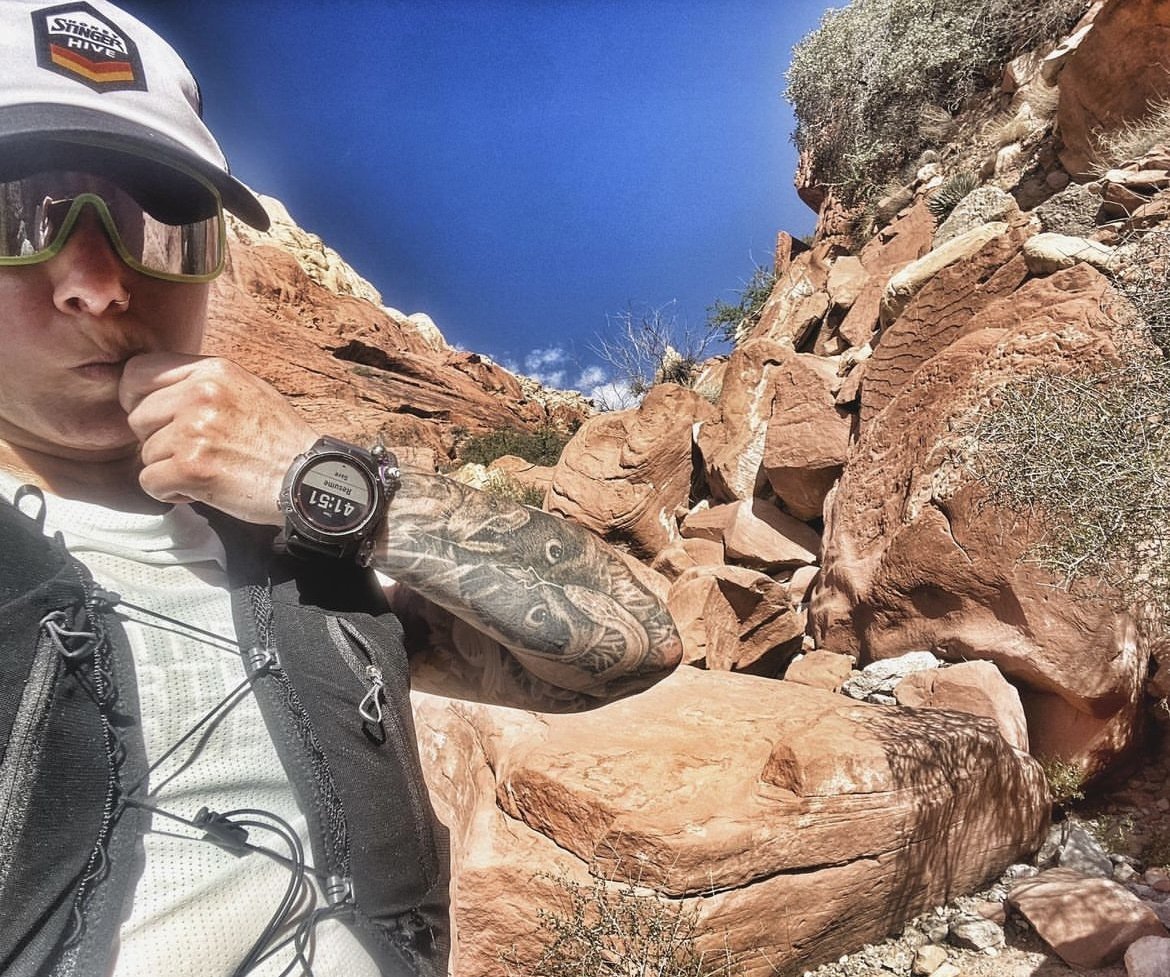Ultramarathon Training Tips for Beginners
By Marnie Kunz, NASM-certified trainer, USATF- RRCA-certified run coach
If you’re ultramarathon training for the first time, it can be a challenge to get everything right, juggling high miles, fueling, route planning, and more. But don’t worry - with these tips from seasoned ultra runners and running coaches, you can conquer your next ultra race. Whether you need tips on nutrition, strategy, mental training, or mileage, learn from the inspiring ultra runners who have trekked hundreds of miles around the world and gleaned so much wisdom in the process. Here are the top ultramarathon training tips from the pros:
Related Post: 50K Training Guide
Set A Goal
When you’re starting out, pick a meaningful goal that keeps you motivated, advises Coach Mariel Feigen, an experienced ultra runner and RRCA Level II and USATF-certified running coach.
“Have a goal distance or specific race in mind- the more meaningful, the better!” says Coach Mariel. “Any new running adventure starts with a goal or challenge- it doesn't have to be a specific race if that feels like too much to start, but setting a goal distance or time is essential to your ultra-running journey.”
Give yourself 4 to 6 months to work on your ultramarathon training, Feigan advises, and break down your goals into milestones. Having a meaningful goal will keep you motivated even on arduous, tough running days.
Brooklyn ultra runner Miriam Weiskind, who has been running ultras since 2012, said she began ultramarathon training and racing as a way to experience beautiful places.
“In 2014, I had a very bad bike accident and was reduced to only walking for 6 months after a shoulder repair surgery,” Miriam says. “After that time, I decided that I only wanted to compete by running in the most beautiful of places and all day long—hence ultra trail running.”
Ultrarunning is one of the most challenging physical activities, and having a reason why you run will help you power through your first ultra training program. Find your reason to run and you will never want to quit.
Choose the Best Race for You
Select your ultramarathon carefully, and be sure to choose a course and difficulty level that you can train for. Your big race should get you excited while also being realistic about your training conditions and abilities. If this is your first race that's longer than a marathon distance, choose a course that is not too technical and a distance that is not too much farther than a marathon, such as 50K.
“Pick and choose races wisely,” ultra runner, trainer, and running Coach Talisa Hayes advises. “Choose according to your current fitness level. Never run a race you have not properly trained for because under-training will lead to an injury or to not being able to finish the race. There are easier courses and much harder ones. There are courses where you will be at a higher elevation so you must be acclimated to it.”
Talisa is a NYC running coach who has run 19 ultramarathons and 15 marathons.
Break Your Runs Into Sections
To prevent getting overwhelmed by the distance of your race and ultramarathon training runs, break down long runs into segments. You can do multiple interval training sessions within a day or a few days.
Ultrarunners often do back-to-back long runs to prepare for the intense endurance needed to conquer an ultra race. Follow an ultramarathon training plan, and your training schedule will keep you on track to hit your peak while giving your body enough time to recover from hard efforts. A well-planned training plan will balance your easy runs, speed work like tempo runs, long runs, and rest days.
A structured training program is especially helpful if you're a newer runner and have never trained for ultra running races. Your program will help your body with adaptation so you increase your stamina and mental toughness.
“Always stick to your game plan and break your race into parts,” Coach Talisa says. “That’s what I like to do. I like to pace myself gradually and make sure I am ahead of the cutoffs.”
If your race is 50K (about 31 miles), for instance, you can think of it in 10K sections, focusing on one at a time. You can also integrate your fueling strategy into the different segments of your run.
Follow a Fueling Strategy
Nutrition and hydration are key to your ultra-running success. You’ll want to experiment with different gels, sports drinks, and sources of carbohydrates to see what you can digest the easiest while running long distances.
“Get used to carrying your own water, whether in a handheld bottle or running backpack, and have fun figuring out real food options that work for you and your stomach and caloric intake needs,” Coach Mariel advises. “Granola bars, PB&J sandwiches, cookies, soda, potatoes!”
Eating enough calories during your race is essential to keep your body going. Try different proteins and carbs during your training to find the best strategy for race day.
Start your fueling early and be consistent with it, Coach Talisa says. “Don’t wait until you are depleted because your body will not absorb fast enough for you to feel a boost of energy.”
An important rule of thumb is to stick to foods you know for your ultra race. “Definitely don’t try any new fuels on race day,” Coach Talisa says. “Always stick to things you've been intaking during your training.”
Join a Local Trail Running Group
If you’re just getting into ultramarathon training, join a trail running group in your area for companionship and tips on the trails. Trail runners are a friendly and welcoming lot and you'll gain a lot of insights and guidance that will help you fine-tune your training and racing.
“I’ve never encountered ultra trail runners that weren’t excited to teach me all about the sport and show me trails,” Miriam says. “We all have to learn!”
The trail running community is a welcoming one, says Coach Mariel. “The best part of ultra-running is the community- so find your people! Volunteer at an ultra, or find a local ultra running group to meet up with on the weekends.”
Participants in ultramarathons are a unique and determined breed and you can make lifelong friends as well as learn from other athletes.
Getting in the Miles
Be flexible with how you get in your training miles, Coach Mariel advises. This may look like two runs a day sometimes, commuting by running, and back-to-back long runs on weekends, where you run a long run on Saturday and another long run on Sunday. Increase your weekly mileage gradually and focus on consistency with your base training.
Also, train on the terrain and under conditions that are similar to your race course. Some things to consider in your ultramarathon training include:
What elevation will you be running at?
Will there be streams or rivers to cross in your race?
What is the average weather like for your race location and date?
How much will you be climbing? Will the trails be technical?
Duplicate your race day conditions as much as you can while training, and you’ll be well-prepared for race day. Add hills, water, rocky terrain, and harsh weather to your training program, and you'll maximize your chances of success on race day.
Another great way to get in your miles and practice your race pace is to sign up for shorter distance races leading up to your ultra. Running a half marathon, then a marathon, and finally your ultramarathon will help yoou build your endurance and increase your mileage incrementally while giving you milestone accomplishments.
Ultramarathon Training on the Race Course
Another pro tip is to do some of your ultramarathon training on the race course, if possible. This will give your body and mind the advantage of being able to prepare for your target race with an immersive experience.
“I always study the course prior and if I can, do my training runs on the course so I am mentally prepared for what’s to come,” Coach Talisa says.
Make trips to your race course if you can to go over the route that you’ll be racing. Run on some or all of the course segments, especially training on the hills and difficult areas. This will help you mentally and physically prepare for race day.
Train Your Mind
Ultramarathon training requires as much work on your mind as your body. Practice using mantras and positive self-talk, and trust in yourself. Your ultramarathon training program will also help you sharpen your mental skills as you build confidence and persistence from following the training plan.
“Never doubt your abilities and your training,” says Coach Talisa. Have faith in your strength and endurance, and know that you can conquer all obstacles that come your way.
Embrace the Experience
Ultra running is unlike any other sport and you will see incredible views and meet inspiring people. Try to savor your running experiences. You will be on a long journey so aim to enjoy it as much as you can.
“Have fun! Enjoy the experience and your beautiful surroundings. Those memories can never be duplicated,” Coach Talisa says.
Take in the stunning natural views, enjoy the trails, and appreciate your body’s ability to keep going. Also, connect with other ultra runners, and you'll gain a lot of wisdom and support. You can be the encouragement someone needs to push through the miles. Cheering on fellow runners will give you a mental boost as well.
Despite what many people assume, ultra running is not a solo activity. It takes many people to organize and support a race and the athletes who participate in ultras. You can also bring your own crew to help cheer you on and bring fuel for you on the trail. A strong crew can make your ultra experience even more incredible.
“It’s never about winning the race. It’s always about making the most of the day/race at hand and finishing the race if you can,” Miriam says. “We are so fortunate to have trails to explore and run on, so I make a point to thank the mountains for having me on their trails. Always remember to be kind, to never litter, and to embrace the most challenging of moments (they teach you the most), and to be humble in the smallest and largest of victories.”
Looking for more ultra-running tips? Check out our ultra running guide with more insights from Coach Mariel. For marathon training plans or custom training programs to help you conquer your next big race, head to the Runstreet Training Center. All of our running programs are created by a certified training and running coach to help you crush your running goals.
Have you run an ultra or are you training for one? Tag @Runstreet on Instagram to share your training and get cheered on. And don’t forget to sign up for our Wellness Wednesday newsletter for exclusive training and health tips delivered to your inbox weekly.
Happy running to you, and happy trails!
Related Posts: How to Become an Ultra Runner: Tips from a Pro, Trail Running 101, Tips for Downhill Running from a Run Coach
Marnie Kunz is a NASM-certified personal trainer and USATF- and RRCA-certified running coach based in Brooklyn, NY. Marnie likes helping people get and stay active to enjoy a better quality of life. When she’s not doing fitness things, Marnie enjoys exploring with her dog, a mischievous rescue Akita.





